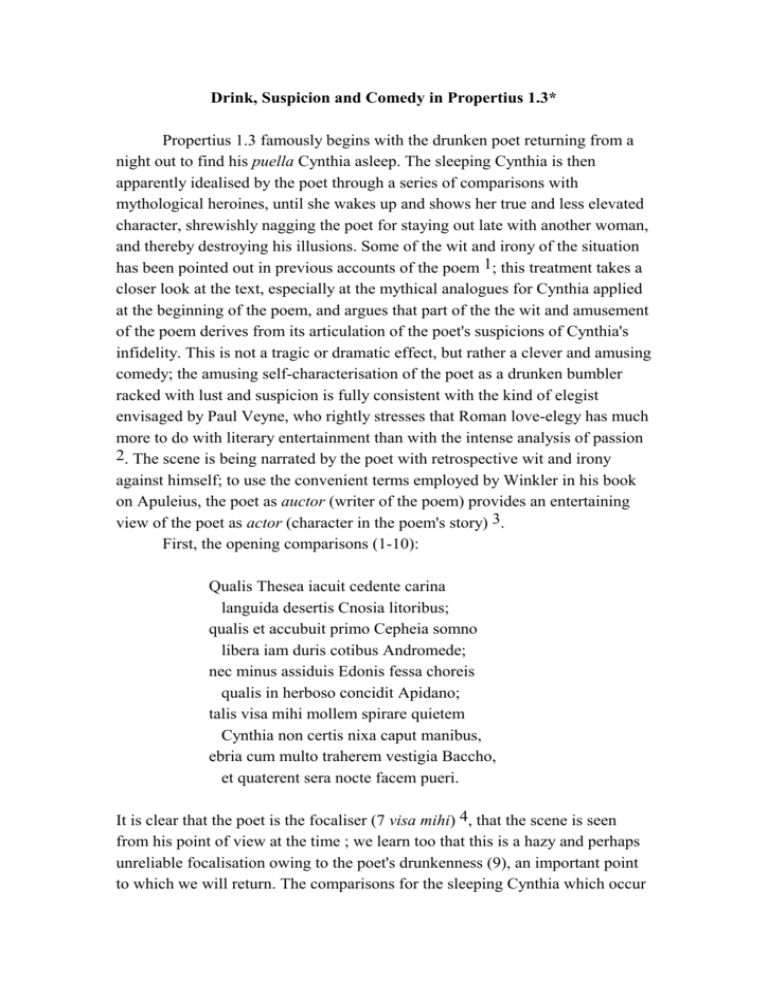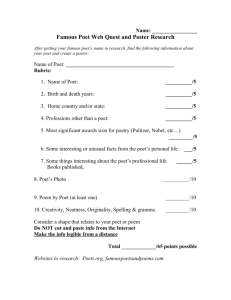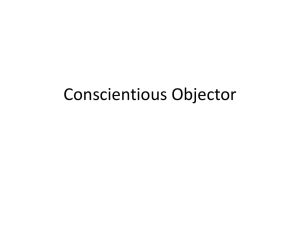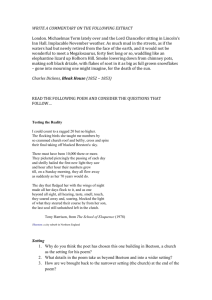
Drink, Suspicion and Comedy in Propertius 1.3*
Propertius 1.3 famously begins with the drunken poet returning from a
night out to find his puella Cynthia asleep. The sleeping Cynthia is then
apparently idealised by the poet through a series of comparisons with
mythological heroines, until she wakes up and shows her true and less elevated
character, shrewishly nagging the poet for staying out late with another woman,
and thereby destroying his illusions. Some of the wit and irony of the situation
has been pointed out in previous accounts of the poem 1; this treatment takes a
closer look at the text, especially at the mythical analogues for Cynthia applied
at the beginning of the poem, and argues that part of the the wit and amusement
of the poem derives from its articulation of the poet's suspicions of Cynthia's
infidelity. This is not a tragic or dramatic effect, but rather a clever and amusing
comedy; the amusing self-characterisation of the poet as a drunken bumbler
racked with lust and suspicion is fully consistent with the kind of elegist
envisaged by Paul Veyne, who rightly stresses that Roman love-elegy has much
more to do with literary entertainment than with the intense analysis of passion
2. The scene is being narrated by the poet with retrospective wit and irony
against himself; to use the convenient terms employed by Winkler in his book
on Apuleius, the poet as auctor (writer of the poem) provides an entertaining
view of the poet as actor (character in the poem's story) 3.
First, the opening comparisons (1-10):
Qualis Thesea iacuit cedente carina
languida desertis Cnosia litoribus;
qualis et accubuit primo Cepheia somno
libera iam duris cotibus Andromede;
nec minus assiduis Edonis fessa choreis
qualis in herboso concidit Apidano;
talis visa mihi mollem spirare quietem
Cynthia non certis nixa caput manibus,
ebria cum multo traherem vestigia Baccho,
et quaterent sera nocte facem pueri.
It is clear that the poet is the focaliser (7 visa mihi) 4, that the scene is seen
from his point of view at the time ; we learn too that this is a hazy and perhaps
unreliable focalisation owing to the poet's drunkenness (9), an important point
to which we will return. The comparisons for the sleeping Cynthia which occur
2
to the gazing poet are naturally highly visual; as has been pointed out, all three
mythological analogues (the sleeping Ariadne, Andromeda, and the sleeping
Maenad), can be found represented in ancient wall-painting, vase-painting or
sculpture 5. The poem appears to be elevating and idealising the puella through
comparison with the heroines of legend, celebrated in poetry and art; Cynthia
appears 'as pretty as a picture'.
But there is more. Each of these stories can be seen not only as
illustrating the appearance of Cynthia through comparison with legendary
females, but also as assigning a complementary mythological role to the poet.
Just as there are two figures active in the story of the poem, the gazing poet and
the gazed-on Cynthia, so there ought to be two corresponding figures in each
mythological story. In each case the reader is given a mythical Cynthiaanalogue, but is invited to construct a mythical Propertius-analogue. In each
case this analogue, for the learned reader who knows mythology and art, turns
out to be a male with erotic intentions, matching the lustful voyeurism of the
poet.
Ariadne is seen collapsed on the beach at the transitional moment when
Theseus is departing, having abandoned her, and just before Bacchus arrives to
rescue her and make her his wife; the arrival of Bacchus, though not narrated,
may be supplied through the passage's evident allusions to Catullus 64 6, which
suggest that poem as model, as usual in post-Catullan treatments of the
Theseus/Ariadne story 7. In the picture of Ariadne there are two missing males
- the departing Theseus and the arriving Bacchus. If Cynthia is Ariadne, which
is Propertius - Theseus or Bacchus ? Bacchus seems most probable; the
returning poet/actor is described specifically as having ebria ... multo vestigia
Baccho (9), and this Bacchic drunkenness, pointedly emphasised by the
metonymy 'god for thing' 8, might be enough to identify him as playing the
Bacchus role, finding his Ariadne alone and asleep. Propertius then seems to be
ignoring the great complaint given by Catullus to Ariadne after Theseus'
departure by presenting her as still asleep when Bacchus ariives, or perhaps
(more wittily) suggesting that she fell asleep again after her mighty vocal
efforts. So, if the poet is the gazer, he is likely to be Bacchus. But who then is
Theseus ? Can it be the poet again, since, as some have suggested 9, he has
clearly earlier played the role of the faithless Theseus by abandoning Cynthia,
as she proceeds to tell him later on (35ff) ? This would be amusingly
incongruous, and might suggest some expression of guilt for having played this
callous role; unlike the heartless Theseus, the poet may be repenting his earlier
desertion by returning, thus playing the rescuer Bacchus as well.
3
But note at this point two particular details: the present tense of the
participle cedente and the adjective languida. Cedente suggests that if there is
an analogue for Theseus, he has just departed or is even still engaged in the
process of departing, and is not the poet, who has clearly been out of the house
for some time. Languida can have clear connotations of sexual fatigue 10,
precisely as Cynthia uses the same adjective of the poet later at 38. These, taken
together, suggest that one possible analogue for Theseus is not the poet but
some other lover, who in the time-honoured tradition of the Roman adulterymime is making or has just made his escape from Cynthia's bed when the poet
returns 11. Cynthia's sleep could be not that of the just but that of post-coital
exhaustion, and she, like the Ariadne of the mythical analogy, could be asleep
at the point where she is passing from one sexual partner to another, at least in
the suspicious mind of the poet at the time.
For it is important to stress that this rival lover need not exist in reality or
even in probability; he only needs to be there as a possibility in the irrationally
fearful mind of the drunken poet. But this fear, if admitted, introduces a new
element into the scenario. Given that the scene is focalised by the poet, the fact
that his view of the puella includes suspicions of infidelity might suggest that
these are habitually present for him, that this is the normal way he thinks about
Cynthia. Given Cynthia's characteristic behaviour in other poems of Book 1,
showing levitas and perfidia in not coming to visit Propertius when he is ill
(1.15), going off to the disreputable resort of Baiae without him (1.11), or even
planning to abandon him in order to accompany a provincial governor to Illyria
(1.8a and 8b), this would not be particularly surprising; as with Catullus and
Lesbia, regular infidelity is expected of an elegiac puella 12. In this context,
such suspicions are not tragic but comic; the poet is after all returning from a
night on the town, and may well have been unfaithful himself, as Cynthia
suggests (35-38; note that the poet is not given a chance to make a selfjustifying reply). His apparent fear, however oblique and irrational, that Cynthia
too may have been engaged in sexual activity with another is both ironic and
poetically just. Such a fear also sets up an amusing contrast between the poet's
suspicions and Cynthia's later accusations made against him, which perhaps
suggest that for Cynthia attack is the best form of defence, and that the lady is
protesting too much in her indignant presentation of her own virtue, a feature
which can again be paralleled in stories related to the adultery-mime 13. Again,
whether or not she is to be believed is ambiguous, and this is part of the
humorous effect contrived retrospectively by the poem - the fears of the poet
might be groundless over-reaction due to drink.
4
With this in mind, we can proceed to the second mythological analogue
for Cynthia, Andromeda. Again the details pinpoint a particular moment in the
story - the first sleep enjoyed by Andromeda after her escape from being
chained to the rock. The detail that she is seen after her liberation should mean
that she is seen by her liberator Perseus, who as her future husband provides the
logical mythological analogue for the erotic gaze of the poet here. We are told
by Ovid that Perseus gazed at the bound Andromeda and fell in love with her,
and this element may have been in the Euripidean original; it seems clear at
least that Euripides' Andromeda opened with the spectacle of Andromeda tied
to the rock, whether asleep or awake, and that scenes representing Andromeda
and Perseus were common in ancient art 14. This time the effect is not
suspicion of faithlessness but a comic reflection on the figure of the poet. As
has been noted 15, the poetis here implicitly compared with the heroic figure of
Perseus, who has earned his gaze on Andromeda by great deeds in her defence;
the poet, on the other hand, has done nothing but get drunk and spend a night
on the town. The comedy is that of incongruity; the poet can picture himself as
Perseus to Cynthia's Andromeda, but this is only a drunken fantasy which the
reader can instantly regard as risible.
Ironies similar to those of the Ariadne allusion may be extracted from
the third mythological analogue, that of a sleeping Maenad. As has been noted,
Cynthia resembles the Maenad in her potential for violence when awoken 16,
but the comparison may also be sexually comic. The Maenad of the simile
sleeps on a grassy river-bank; single women finding themselves next to a river
in mythology are likely to be ravished by its river-god or another water-deity
(examples are Tyro, raped by Poseidon in the river Enipeus, Perimede,
assaulted by the river-god Achelous, and Ilia, attacked by Mars by an unnamed
river) 17. There may also be an allusion to the accusation traditionally made
against the female worshippers of Bacchus, most notably in Euripides' Bacchae,
that their orgiastic rites included wanton sexual congress with men 18. At least
in the hyper-suspicious mind of the poet, the sleeping Maenad can match
Ariadne as an image of sexual exhaustion; the previous wild ravings of the
Maenad could have an obvious parallel in previous sexual activity on the part
of Cynthia.
Again we need to find an analogue for the gazing poet. As a Bacchic
drunk (cf. line 9 again), it is wholly fitting for him to gaze upon a sleeping
devotee of Bacchus; this suggests an analogy with male Bacchic figures
commonly associated with Maenads. Here the detailed evidence of art is
important. A number of depictions of sleeping Maenads in Greek vase-painting
5
and Campanian wall-painting show them being voyeuristically watched and
even fondled by erect satyrs 19. This parallel seems clearly significant given the
poet's own initial reaction to gazing on Cynthia (13-16). Like that of the satyrs,
his sexual appetite has been aroused by drink and by the sight of the sleeping
female, and it is only the thought of the verbal violence he will suffer on
waking her up which prevents him from attempting an immediate sexual
approach (15-16). Like the Maenad, Cynthia is likely to prove dangerous in a
waking state - cf. 17-18:
non tamen ausus eram dominae turbare quietem,
expertae metuens iurgia saevitiae.
No doubt we are to think of the drunken poet as himself aroused but afraid to
pursue his desires, a comic and amusing picture. There may indeed be a play on
this in 14 hac Amor hac Liber, durus uterque deus, with durus perhaps
suggesting that its is alcoholically-induced libido which gives the poet an
erection 20.
Thus we are left at the end of the mythological catalogue with an
amused sense of the poet's suspicions and of his comic playing of male heroic
roles, communicated through significant mythological detail. By these means
the poem invites the reader to be amused at the drunken fears of the poet, which
at this stage may or may not be justified, and to enjoy the poetic justice of his
fears about Cynthia's infidelity when he himself may well have been equally
faithless that same evening; the laugh is on him.
The same type of humour is maintained in a further mythological simile,
a natural continuation of the opening catalogue, at 19-20:
sed sic intentis haerebam fixus ocellis,
Argus ut ignotis cornibus Inachidos.
Again the theme is chosen for its particular mythological context. The
suspicious but befuddled poet is amusingly cast as the proverbially vigilant
Argus, set by Juno to guard the transformed Io after Jupiter had possessed her.
Argus was famously ineffective in his watch, being slain by Mercury 21, and
this suggests perhaps that however carefully the poet now surveys the puella he
cannot successfully guard her from the attentions of others. He may indeed just
have failed to do so; Cynthia may match Io in having received the attentions of
another. These possibilities conjured up by the presentation of the poet's
6
fuddled suspicions are surely amusing. The astonishment of the poet at the sight
of Cynthia, which looks on the surface like romantic rapture, could have a
rather different and more amusing explanation; the poet is viewing the familiar
form of Cynthia with wild surmise, not through love but through an alcoholic
haze. The acts which follow similarly fit his drunken state, and the imperfects
solvebam, ponebam, gaudebam, dabam and largibar are perhaps conative
rather than frequentative; the drunken poet tries ineffectually to perform actions
of loving homage, but the effect is comic rather than pathetic. Again the laugh
is on him.
When he is in this maudlin mood, we find the most overt reference to his
suspicions about Cynthia (27-30):
et quotiens raro duxti suspiria motu,
obstupui vano credulus auspicio,
ne qua tibi insolitos portarent visa timores,
neve quis invitam cogeret esse suam.
The poet's drunken over-reactions to Cynthia's moans in sleep are surely
amusing; his tender solicitude is at least partly mixed with an exaggeration
which gives a comic effect for the reader (note obstupui, recalling the similar
astonishment at 19-20). At line 30 his real fear emerges: Cynthia may be
dreaming that another makes her his by force. This thought is stimulated by
nothing in particular, and is presented as lying at the back of the poet's mind as
a possibility in the real world; the humorous irony for the reader is that if she
has indeed been possessed by another this very evening, as the comparison with
Ariadne might suggest, it was clearly not against her will.
Cynthia's rebuke of the poet on waking, as already suggested, launches
at once into attack, possibly as the best form of self-defence (35-40):
'tandem te nostro referens iniuria lecto
alterius clausis expulit e foribus ?
namque ubi longa meae consumpsti tempora noctis,
languidus exactis, ei mihi, sideribus ?
o utinam talis perducas, improbe, noctes,
me miseram qualis semper habere iubes !'
Immediately she assumes that he has been with another woman; this is perhaps
a reasonable deduction from his alcoholic state and the time of night, but it may
7
also suggest her own possible infidelity, accusing the poet by guilt transference
of her own offence. Languidus at 38 again has clear connotations of sexual
exhaustion ; one amusement for the reader derives from the fact that this is
precisely the state in which the poet imagined Cynthia to be when he first saw
her (languida, 2). Equally comic is the imprecation she hurls at him, which if
the poet's suspicions are true entails the opposite of its surface meaning; the
puella's nights are spent alone according to herself, but not according to the
poet's fears, and in fact they may have spent this particular evening in similar
rather than diverse ways.
The occupations with which Cynthia finally claims to have whiled away
the hours show an interesting ambiguity (41-6):
'nam modo purpureo fallebam stamine somnum,
rursus et Orpheae carmine, fessa, lyrae;
interdum leviter mecum deserta querebar
externo longas saepe in amore moras,
dum me iucundis lapsam sopor impulit alis;
illa fuit lacrimis ultima cura meis.'
The claim to have been spinning wool makes her a paragon of Roman wifely
virtue 22; but the fact that it is purple, the colour of luxury garments, rightly
suggests that she is no conventional spouse; we recall that elegiac poets are
wont to rebuke their puellae for extravagance of dress 23, including the
wearing or desiring of purple 24. The lyre, too, perhaps suggests that the puella
has taken up the poet's own instrument to show her longing for and affinity
with him (Propertius alludes elsewhere more than once to Cynthia's musical
talents 25), but again we should remember that proficiency on the lyre marked a
woman out as a disreputable professional party-entertainer, or at least as
undesirably similar to one; such players were normally thought of as in the
same class as meretrices 26. Thus the puella's attempts to say the right thing
could also be taken as implying her possible unreliability; perhaps she is
making herself clothes to please men other than the poet (this is a common
reason for the elegiac poet's objections to costly dresses) 27, perhaps she has
been using her skills on the lyre to entertain a rival. Even her stress on her
solitude for the whole evening (mecum ... querebar as well as deserta), on the
surface an element of pathos to make the poet feel guilty, might suggest that
she was anxious to stress this because it was untrue. The poem opens up these
possibilities, for the amusement and entertainment of the reader.
8
This view of Propertius 1.3 as a comic examination of the poet's passion,
suspicion and drunkenness derives some support from a later poem which is
clearly related to it, Ovid Amores 1.10, which also opens with a mythological
catalogue conveying the poet's view of the puella (1-8):
Qualis ab Eurota Phrygiis avecta carinis
coniugibus belli causa duobus erat,
qualis erat Lede, quam plumis abditus albis
callidus in falsa lusit adulter ave,
qualis Amymone siccis errabat in Argis,
cum premeret summi verticis urna comas,
talis eras : aquilamque in te taurumque timebam
et quicquid magno de Iove fecit amor.
The verbal and thematic links confirm the imitation. Amores 1.10 has
traditionally been seen as an amusing parody or variation of its more serious
model 28, but there may be more to link the two than this. Ovid seems to
provide the same amusing use of myth as Propertius; all the heroines he
chooses are parties to adultery or extra-marital relationships, no doubt alluding
to the nature of Ovid's own relationship with the puella addressed here, just as
all the heroines chosen by Propertius are gazed on by a male voyeur parallel to
the poet. More importantly, the whole context in Amores 1.10 is that of Ovid's
proclaimed fears for his puella ; she seemed so attractive to him that he thought
that she would become a victim of erotic kidnap or rape, like Helen (kidnapped
by Paris), Leda (raped by Zeus in the form of a swan) or Amymone (raped by
Poseidon). This surely looks back to the element of fear on the part of the poet
which we have identified in the myths of Propertius 1.3.1-8. Of course, Ovid
makes this statement rhetorically, and will undercut it rapidly by saying that he
no longer feels the same about the puella since she has asked for presents (912), but it seems that he too identified some element of erotic suspicion in his
model, and used it in his own way.
In sum, Propertius 1.3 is a comic study of the poet's drunkenness and of
his fears of the puella's infidelity. It is comic rather than tragic or pathetic
because the poet's fears and suspicions are allowed to emerge from a witty
interpretation of the myths describing the sleeping puella, and because the
reader is fully aware that those fears are quite possibly unfounded, and that
even if well-founded they are likely to be hypocritical in a poet who has that
evening been out on the town himself. The poem is thus learned, witty and
9
entertaining as well as psychologically interesting; as one of the first poems in
Book 1 it also sets the agenda for the relationship between poet and puella, one
of stormy passion but described in a manner calculated more to amuse than to
move the reader.
Corpus Christi College, Oxford
S.J.HARRISON
10
Notes
*I am indebted to Philip Hardie and to the referee for PCPS for a number of
useful suggestions, to Stephen Heyworth for essential bibliographical aid, and
to Robin Osborne for kind help with the iconographical material of notes 5 and
19 (below).
1. For treatments of the poem to 1983 cf. P.Fedeli and P.Pinotti, Bibliografia
properziana 1946-83 (1985) 52-4. Note the commentaries on Book 1 by
P.Fedeli (1980) and R.J.Baker (1990), and the treatment by R.O.A.M.Lyne, The
Latin Love Poets (1980) 98-100 and 114-20; among the more useful of the
large number of articles on rthis poem are G.Lieberg, GIF 14 (1961) 308-26,
L.C.Curran, YCS 19 (1966) 189-207, A.Wlosok, Hermes 95 (1967) 330-52,
D.P.Harmon, TAPA 104 (1974) 151-65, and R.J.Baker in C.Deroux (ed.),
Studies in Latin Literature and Roman History 2 (1980) 245-58, . Since 1983
cf. P.Fedeli, ANRW II.30.3 (1983) 1871-75, F.M.Dunn, ICS 10 (1985) 239-50,
and J.D.Noonan, CJ 86 (1990-1) 330-36.
2. P.Veyne, Roman Erotic Elegy (1988), esp. 31-66.
3. Cf. J.J.Winkler, Auctor and Actor : A Narratological Reading of Apuleius'
Golden Ass (1985) 135-53.
4. On focalisation and point of view see the excellent bibliography gathered by
D.P.Fowler, PCPS n.s. 36 (1990) 58 n.1.
5. Cf. esp. Wlosok (n.1) 335-40, and K.Keyssner in W.Eisenhut (ed.), Properz
(1975) 268-76. For the frequent ancient depictions of the sleeping Ariadne and
sleeping Maenad, sometimes indistinguishable given the Bacchic angle to the
Ariadne story, cf. S.McNally, Classical Antiquity 4 (1985) 152-92. There are no
recorded representations of Andromeda asleep, but her liberation by Perseus is
a common theme in Campanian wall-paintings copied from earlier Greek
versions - cf. R.Ling, Roman Painting (1991), 131; Keyssner (above) 275-6
suggests that Propertius may have transferred the image of the sleeping heroine
observed by the hero to the Perseus/Andromeda story from artistic depictions of
other similar romantic episodes, which seems quite possible.
11
6. Prop.1.3.1 cedente carina ~ Catullus 64.249 cedentem ... carinam (with the
noun similarly at the end of the hexameter), 1.3.2 desertis ... litoribus ~
Catullus 64.133 deserto ... in litore. For further points on Propertius's use of
Catullus 64 cf. Wlosok (n.1) 338-9.
7. Cf. e.g. Ovid Heroides 10, Ars Amatoria 1.525-568, Fasti 3.459ff.
8. For this feature cf. A.S.Pease on Cicero De Natura Deorum 1.40.
9. So Lyne.( n.1) 99.
10. For this sexual sense of languidus cf. Tibullus 1.9.56 and Priapea 47.4.
This nuance is stressed by R.J.Baker in his 1980 article, 249-53, and repeated in
his 1990 commentary (for both cf. n.1), but he regards it as expressing
Propertius' own sexual desire rather than his suspicions of Cynthia, although it
describes her rather than him.
11. On the plot of the adultery-mime cf. Ovid Tristia 2.497-508; on its
influence on elegy cf. J.C.McKeown, PCPS n.s. 25 (1979) 71-84 (he does not
include this passage).
12. Cf. e.g. Catullus 68.135-40.
13. Cf. e.g. Apuleius Met. 9.26, where a baker's wife noisily declaims against
adultery to her husband while her lover lies hidden in the house.
14. Ovid Met. 4.672-77; for a reconstruction of the Euripidean Andromeda cf.
T.B.L.Webster, The Tragedies of Euripides (1967) 192-9, and for its possible
detailed use in Propertius 1.3 Noonan (n.1). For the depiction of Andromeda in
art and its relevance to this passage cf. n.5 above.
15. Cf. Lyne (n.1) 99.
16. Cf. Lyne (n.1) 99.
17. For Tyro and Poseidon cf. Odyssey 11.235ff, Hesiod fr.30.31ff
Merkelbach/West, Apollodorus Bibl.1.9.8; for Perimede and Achelous cf.
12
Apollodorus Bibl. 1.7.3 (Ovid calls her Perimele and has the most elaborate
version - cf. Met.8.590-610); for Ilia and Mars cf. Ovid Fasti 3.11-24.
18. Cf. E.R.Dodds' note on Euripides Bacchae 222-3.
19. For illustrations of such scenes cf. McNally, art.cit. (n.5), plate II fig.2 (a
red-figure kylix in Boston), and a red-figure hydria in Rouen, conveniently
illustrated in F. Lissarrague, 'Figures of Women' in P.Schmitt-Pantel (ed.), A
History of Women in the West : I (1992) 224. Lissarrague's discussion there is
illuminating on the satyr's 'constant state of erection' and 'fantasies of
voyeurism and rape' (224) in such depictions. My colleague Robin Osborne will
publish a full list of depictions of satyrs and Maenads together in extant vasepainting in a forthcoming article, 'Desiring Women on Athenian Pottery'.
20. This point is made by Curran (n.1) 199. Rigidus is the standard adjective
describing erections in Latin (cf. OLD s.v. b, J.N.Adams, The Latin Sexual
Vocabulary (1982), 103), but durus (pace Fedeli's dismissal of Curran's point in
his commentary) can be used similarly (cf. Ovid Fasti 2.346 et tumidum cornu
durius inguen erat). In the Propertius passage it would seem to mean 'making
hard', without strict parallel but the kind of poetic extension of meaning we find
at Ovid Fasti 4.364, where insana ... aqua must mean 'maddening water', an
active sense of insanus not found elsewhere.
21. For the story of Io and Argus cf. most notably Ovid Met.1. 588-721. Like
the three opening vignettes, the picture of Argus guarding Io has parallels in
Campanian wall-painting deriving from an earlier Greek model - cf. Ling, (n.5)
130.
22. For the idealised image of the wool-spinning matrona cf. Lyne (n.1) 7. The
'wife' spinning at home and awaiting the absent 'husband' also recalls the
Odyssean Penelope, as Fedeli's note on the passage implies.
23. e.g. Propertius 1.2, the immediately preceding poem; see the introduction to
the poem in Fedeli's commentary for parallels in elegy.
24. On the undesirability of purple for the elegiac puella cf. Tibullus 2.3.58,
2.4.28, [Tibullus] 3.3.18.
13
25. On Cynthia's musical talents cf. Propertius 1.2.27-8, 2.1.9-10.
26. For this dubious aspect of lyre-playing cf. P.McGushin's note on Sallust
Cat. 25.2 and G.M.Paul, PLLS 5 (1985) 15.
27. e.g. Propertius 1.2.4, [Tibullus] 3.3.13.
28. Cf. e.g. Lyne, op.cit. (n.1), 252-4, or J.C.McKeown's note on Amores
1.10.1-8.









